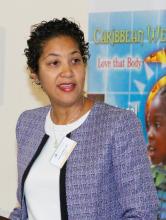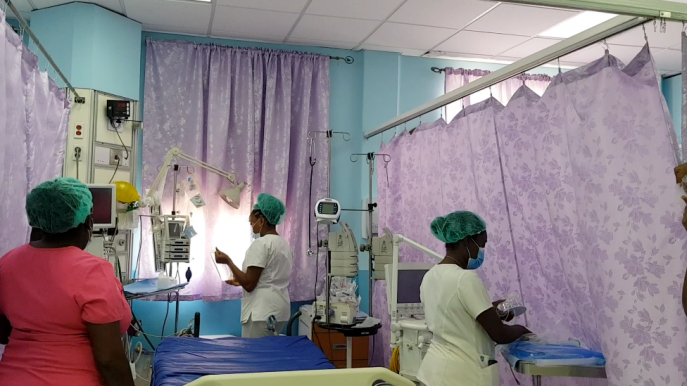A cadre of 82 nurses across 7 Caribbean countries - Antigua and Barbuda, Belize, Barbados, Dominica, Guyana, Suriname and Trinidad and Tobago – have received training to support critical care in intensive care units for COVID-19 patients.
Ministries of Health in the Caribbean were faced with a shortage of critical care nurses, who were urgently needed to care for the increasing number of COVID-19 patients in intensive care units.
Caribbean countries are making progress to develop a health workforce that is appropriate to the context, and qualified to meet the health needs of their people, including in times of crisis.
PAHO/WHO in collaboration with the UHC Partnership supported 82 nurses to attend a 4-week training course, and scaled up the capacity of the health workforce in the Caribbean during the COVID-19 pandemic and beyond.

"When we were approached about scaling up the training, we knew it was a great idea to take this on at the subregional level. Taking the training to scale allows all Caribbean countries to benefit from the shared knowledge and standardized approach to the training – it’s a public good available to the entire Caribbean.”

"The best part is that it is developed by the University of the West Indies for nurses in the Caribbean. That is really critical because it means that when nurses come out of this initial course, anyone anywhere in the Caribbean who is practicing can benefit, especially as it relates to COVID-19.”

"The genesis of the course, the introduction to critical care nursing, was interesting. With COVID-19 as a pandemic, there was a need for scaling up of nursing personnel to respond to the pathophysiology of the disease. We were asked by the Ministry of Health in Trinidad and Tobago, to develop this programme, but when we recognized that this is an issue that was not just affecting Trinidad and Tobago, we decided to reach out to PAHO/WHO and ask for support.”

"The impact will not only be in our ICU but it will also be to the wider nursing staff, because with these nurses gaining confident skills, knowledge and competence, it will also impact the care they give on the general wards, which means that our patients will benefit from improved outcomes. So it is fantastic.”
The Long Read
Brittany Baptise is a nurse at the Scarborough General Hospital in Trinidad and Tobago, in the Caribbean. Today is her day off and she smiles as she describes how nervous she was when she learned that she would be working in an intensive care unit (ICU) to treat COVID-19 patients.
“I was a bit fearful because, coming from the medical ward, we didn’t really know the rules and function of an ICU. I had no formal training, I had little knowledge about how the ventilator works, the settings and these things.”
By the end of September 2020, Brittany was trained and working in the ICU with new skills and competencies to offer as part of an integrated team of health professionals. She was one of a cadre of 82 nurses across 7 Caribbean countries to take part in a 4-week training course to learn new skills and competencies to work in ICUs. These nurses are now making significant contributions to hospitals across the Caribbean providing critical care to COVID-19 patients.
This is crucial to the achievement of universal health coverage (UHC), which is dependent on a sufficient, equitably distributed and well-performing health workforce. The arrival of COVID-19 has severely challenged progress in this area.

©PAHO/WHO
Urgent need for critical care nurses during the COVID-19 pandemic
In March 2020, the Caribbean Region recorded its first imported case of COVID-19. By mid-March 2021, there had been more than 100,000 confirmed cases, and some 2,000 deaths across 20 countries in the Caribbean. The pandemic exposed a range of weaknesses in country health systems and the health workforce; a key problem being a shortage of critical care nurses.
Registered nurses play an important role in the delivery of quality care to patients especially in the critical care environment. With the rising numbers of new COVID-19 infections and associated complications, nurses had to be prepared to function at a higher level within the critical care clinical environment.
However, Ministries of Health in the Caribbean were challenged with a shortage of properly trained critical care nurses. It was clear that the numbers, skills and capacities of these nurses required boosting.
Recognizing the urgent need, the University of West Indies School of Nursing, a PAHO/WHO Collaborating Centre for Nursing and Midwifery, developed a course to equip nurses with the right skills and competencies to provide critical nursing care in ICUs.

Guyana©PAHO/WHO
“The genesis of the course, the introduction to critical care nursing, was interesting. With COVID-19 as a pandemic, there was a need for scaling up of nursing personnel to respond to the pathophysiology of the disease. We were asked by the Ministry of Health in Trinidad and Tobago, to develop this programme, but when we recognized that this is an issue that was not just affecting Trinidad and Tobago, we decided to reach out to PAHO/WHO and ask for support,” said Dr Oscar Noel Ocho, Director of the University of the West Indies School of Nursing.
“When we were approached about scaling up the training, we knew it was a great idea to take this on at the subregional level. Taking the training to scale allows all Caribbean countries to benefit from the shared knowledge and standardized approach to the training – it’s a public good available to the entire Caribbean,” added Jessie Schutt-Aine, Subregional Programme Coordinator for the Caribbean.
The PAHO/WHO Trinidad and Tobago Country Office supported the training of 2 cohorts of a total of 50 nurses from the Ministry of Health of Trinidad and Tobago. The PAHO Subregional Programme for the Caribbean, through the UHC Partnership, supported an additional cohort of 32 nurses from 6 other countries of the Caribbean: Antigua and Barbuda, Belize, Barbados, Dominica, Guyana and Suriname.
The UHC Partnership works in 115 countries and areas to help governments accelerate progress towards UHC with a primary health care approach, through funding provided by the European Union (EU), the Grand Duchy of Luxembourg, Irish Aid, the Government of Japan, the French Ministry for Europe and Foreign Affairs, and the United Kingdom – Foreign, Commonwealth & Development Office and Belgium.

©PAHO/WHO – Brenda Lashley
Related work on health security
During the COVID-19 pandemic, PAHO and the UHC Partnership with additional funds from the EU, have supported health security and emergency preparedness activities in the Caribbean including strategic risk assessment, strengthening regulation and surveillance of medicines and vaccines safety and quality, and capacity building on the International Health Regulations (IHR 2005). Support has also been provided in the review of legislation to support implementation of public health measures, training to establish national emergency operations centres, and the development of epidemiological analysis capacity at the national and sub-national level.

©PAHO/WHO – Sonia Mey-Schmidt
Critical care training in theory and practice
“The best part is that it is developed by the University of the West Indies for nurses in the Caribbean. That is really critical because it means that when nurses come out of this initial course, anyone anywhere in the Caribbean who is practicing can benefit, especially as it relates to COVID-19,” said Dr Erica Wheeler, PAHO/WHO Representative.
The 4-week training was a combination of virtual sessions with face-to-face training in a clinical setting. The nurses took part in daily theoretical online sessions, and for one day a week they had face-to-face training in a critical care setting. The course covered clinical care for COVID-19 patients; foundations of critical care; management of respiratory conditions; renal dysfunction and replacement theory; epidemiology and infection control; management of neurological conditions; and the Critical Care Practicum.
In each hospital, the Ministry of Health identified a member of staff who acted as preceptor and provided mentoring and clinical supervision to the student nurses.
One of the preceptors was Rehemia Reyes, Head Nurse of Adult ICU at the Eric Williams Medical Sciences Complex. “One of the challenges that we faced during this intensive care introduction is that nurses were totally unfamiliar with the ICU environment. For most of them, it was their first time to step into the ICU, which is very intimidating because of all the unfamiliar equipment,” she said.

©PAHO/WHO
Already, changes are taking place with nurses actively working in ICUs in hospitals across the region. Nurses who have been trained are able to think critically about their work in the ICU, are no longer intimidated by the ward environment and equipment, are able to better assess patients and communicate more effectively with patients and colleagues. From a health systems perspective, the nurses have gained new skills, which they can transfer to general wards, and their additional capacities can facilitate task sharing and task shifting as an alternative to shortages of health care workers during the pandemic.
Michelle Edwards-Benjamin, Secondary Care Nurse Manager at Scarborough General Hospital, Tobago said, “This course has had a tremendous impact on the services that we offer here in Trinidad and Tobago. Firstly, it has increased the capacity of the staff to work in the ICU. The course came at a time where we were moving from a 2-bedded ICU to a 5-bedded facility, and obviously with the increase in beds there was a great demand for staff. So this course gave our untrained staff a foundation, which they could use to build upon and enable them to work in the ICU. It really improved our competence, our capacities in our staffing and it also allowed us to provide a higher quality of care for our patients needing ICU care.”
Sherma Alexander Campbell, General Manager of Nursing of North West Regional Heath Authority, Port of Spain, General Hospital said, “The impact will not only be in our ICU but it will also be to the wider nursing staff, because with these nurses gaining confident skills, knowledge and competence, it will also impact the care they give on the general wards, which means that our patients will benefit from improved outcomes. So it is fantastic.”

|

|

|

|
WHO has declared 2021 as the International Year of Health and Care Workers in recognition of their dedication to providing care during the COVID-19 pandemic that has challenged health systems worldwide. Health workers, including critical care nurses are vital to health emergency responses and for health system preparedness and resilience. Having greater numbers of skilled nurses means that more people can access the care they need and fewer will die. This critical care training will also have an impact beyond the ICUs and contribute to a stronger health system overall throughout the Caribbean.
